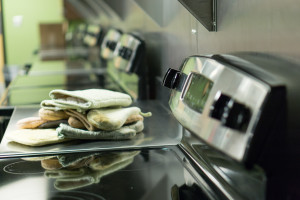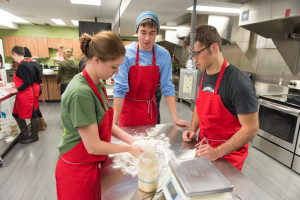
Last semester, Colorado State University faculty and students got a new place where they can turn up the heat — or just chill.
The kitchen facility in the Gifford Building used by the Department of Food Science and Human Nutrition received a major facelift last summer, going from a 1950s-style collection of formica and wood counters, stovetops and ovens to a state-of-the-art, newly equipped world of stainless steel.
And it was due in part to a fundraising campaign called “Transform Our Kitchen.”
 “It’s hard to teach students about food safety when you’ve got cracked counter surfaces,” said Professor Martha Stone, adding that composting has replaced the sink disposals. “Now we’re green, and we’re not calling facilities management once a month to unclog a disposal.”
“It’s hard to teach students about food safety when you’ve got cracked counter surfaces,” said Professor Martha Stone, adding that composting has replaced the sink disposals. “Now we’re green, and we’re not calling facilities management once a month to unclog a disposal.”
Expanded mission
Associate Professor Jeffrey Miller said the previous kitchen, which featured individual units equipped with a stovetop, oven, sink and cabinets, was created during an era when a departmental mission was to train students how to be cooks. Now, that mission has expanded to accommodate higher enrollment in hospitality management and new areas like fermentation science: The remodeled facility features three fermentation incubators.
“We were using an old wine refrigerator in there before,” he said.
The new layout features reconfigurable work stations — stainless steel tables on wheels — that make better use of the space. New commercial convection ovens line the back wall, and there are dedicated areas for washing, cutting/slicing and rolling/shaping. Exhaust hoods and additional storage areas were added, as well as a commercial dishwasher with a three-minute cleaning cycle.
“Now the equipment can easily be changed out to keep it up to date,” Miller said, noting that he’d like to add a “combi” steam/convection oven at some point. “We will also have an overhead camera installed, so that students can watch remotely. It just gives us more possibilities in lots of areas.”
Before, during and after
[masterslider id=”131″]
Additional space
The walls around a TA office were removed, adding about 300 square feet to the large room, according to Karen Hanawalt of lab support. She added that retractable outlets hanging from the ceiling provide versatility.
“It used to be that you had to have the deep fryer in a certain place because that’s where the outlet was,” Miller said.
Postdoctoral fellow Laura Bauer said the more contemporary setup is better suited for demonstrations, thanks in part to a large tilted mirror hanging from the ceiling that lets students see what’s being done on the countertop.
“If you participate, and see it, you’re more likely to remember it, versus reading about it in a book,” Stone said.
 Associate Professor Marisa Bunning added, “You can tell them about food, but you have to do it to really learn it.”
Associate Professor Marisa Bunning added, “You can tell them about food, but you have to do it to really learn it.”
Multiple uses
Bunning explained that in addition to new surfaces that improve food safety, the revamped kitchen better resembles the settings in which students will spend their careers. Plus, she said, it can be configured for research projects, or for workshops on canning and other topics that will be available remotely for CSU Extension agents.
The project’s pricetag, nearly $600,000, was covered primarily with funding from CSU’s central administration, but the “Transform Our Kitchen” fundraising campaign has also generated about $5,000 to date, according to Department Head Michael Pagliassotti.
“Hats off to the CSU construction crew for getting this project done on time,” Miller said.
“There were lots of times that they worked well into the night,” Bunning added.
For more information, or to donate, visit https://advancing.colostate.edu/fshnkitchen. Additional photos are available on Flickr. The Department of Food Science and Human Nutrition is part of CSU’s College of Health and Human Sciences.